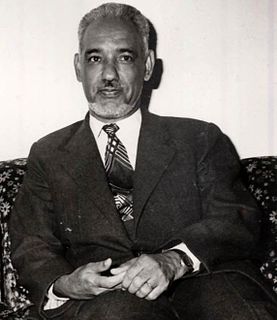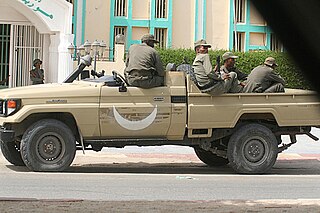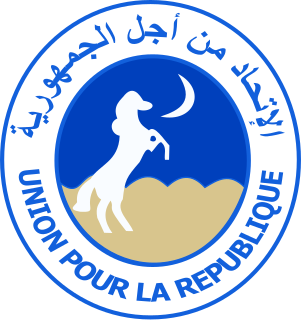
The first fully democratic Presidential election since 1960 occurred on 11 March 2007. The election was the final transfer from military to civilian rule following the military coup in 2005. This was the first time the president was selected by ballot in the country's history. The election was won by Sidi Ould Cheikh Abdallahi, who was ousted by a military coup in 2008 and replaced by general Mohamed Ould Abdel Aziz.

Moktar Ould Daddah was the President of Mauritania from 1960, when his country gained its independence from France, to 1978, when he was deposed in a military coup d'etat.

Prior to the coup d'état of August 2005, Mauritania was a one party dominant state with the Democratic and Social Republican Party in power. Opposition parties were allowed, but widely considered to have no real chance of gaining power.

The National Assembly is the legislative house of Parliament of Mauritania. The legislature has 157 members, elected for five-year terms in single or two-seats constituencies. From 1961 until 1978, the only legal party in the country was the Mauritanian People's Party. The legislature was disbanded after the 10 July 1978 coup. In 1992, a bicameral legislature was established, consisting the National Assembly and Senate of Mauritania. In the 1990s, a multiparty system was introduced in Mauritania. However, the Democratic and Social Republican Party dominated the parliament until a coup in 2005. The first truly democratic elections were held in 2006.

Parliamentary and municipal elections in Mauritania occurred on 19 November and 3 December 2006. At least 28 political parties competed to comprise the lower house of parliament, the National Assembly; Islamist parties were banned, but many Islamists ran as independent candidates. 95 seats in the National Assembly were at stake in the election, along with over 200 local councils.

The Socialist Democratic Unionist Party (PUDS) is an Arab nationalist political party in Mauritania. As of 2013, the party is led by Mahfouz Weld al-Aziz.

Mauritania – United States relations are bilateral relations between Mauritania and the United States.

A coup d'état took place in Mauritania on August 6, 2008, when Mauritanian President Sidi Mohamed Ould Cheikh Abdallahi was ousted from power by a group of high-ranking generals he had dismissed from office earlier that day.

Mohamed Ould Abdel Aziz is a Mauritanian politician who is currently the President of Mauritania, in office since 2009. A career soldier and high-ranking officer, he was a leading figure in the August 2005 coup that deposed President Maaouya Ould Sid'Ahmed Taya, and in August 2008 he led another coup, which toppled President Sidi Ould Cheikh Abdallahi. Following the 2008 coup, Abdel Aziz became President of the High Council of State as part of what was described as a political transition leading to a new election. He resigned from that post in April 2009 in order to stand as a candidate in the July 2009 presidential election, which he won. He was sworn in on 5 August 2009.
Moulaye Ould Mohamed Laghdaf served as the Prime Minister of Mauritania from August 2008 until August 2014.

A presidential election was held in Mauritania on 18 July 2009. Mohamed Ould Abdel Aziz, who led the 2008 coup d'état, won a narrow first-round majority in the election, according to official results. A second round, if necessary, would have been held on 1 August 2009.

Parliamentary elections were held in Mauritania on 17 May 1959. The result was a victory for the Mauritanian Regroupment Party, which was the only party to contest the elections, thereby winning all 40 seats in the National Assembly. Voter turnout was 90.3%.

Presidential elections were held for the first time in Mauritania in August 1961 to elect the President for the next five years. Moktar Ould Daddah, who had been acting head of state since independence from France in 1960 was the only candidate, and was elected unopposed. Although he was a member of the ruling Mauritanian Regroupment Party, his candidacy was also supported by the Mauritanian National Union. Voter turnout was 93.6%.

Presidential elections were held in Mauritania on 7 August 1966. Following the merger of all the country's political parties into the Mauritanian People's Party (PPM), the country had become a one-party state in December 1961. Its leader, incumbent President Moktar Ould Daddah, was the only candidate, and was re-elected unopposed. Voter turnout was 96.2%.

General elections were held in Mauritania on 8 August 1971 to elect a President and National Assembly, the first time the two elections had been held together. At the time, the country was a one-party state with the Mauritanian People's Party (PPM) as the sole legal party. Its leader, incumbent President Moktar Ould Daddah, was the only candidate in the presidential election, and was re-elected unopposed to a third term in office, whilst the PPM won all 50 seats in the National Assembly election. Voter turnout for the parliamentary election was reported to be 95.6%.

General elections were held in Mauritania on 8 August 1976 to elect a President and National Assembly. At the time, the country was a one-party state with the Mauritanian People's Party (PPM) as the sole legal party. Its leader, incumbent President Moktar Ould Daddah, was the only candidate in the presidential election, and was re-elected unopposed, whilst the PPM won all the seats in the National Assembly election. Voter turnout was 97.9%. They were the last elections held until the restoration of multi-party democracy in 1992.

Parliamentary elections were held in Mauritania on 23 November. The opposition has vowed to boycott the election unless the president steps down beforehand. A total of 1,096 candidates have registered to compete for the leadership of 218 local councils across Mauritania, whilst 438 candidates are contesting for the 146 parliamentary seats. Some 1.2 million Mauritanians were eligible to vote in the election. The first round results yielded a landslide victory for the ruling UPR winning 56 seats and their 14 coalition partners winning 34 seats. The Islamist Tewassoul party won 12 seats. The remaining seats were contested in a runoff on 21 December 2013. The UPR won the majority with 75 seats in the Assembly.

The Union for the Republic (UPR) is a political party in Mauritania. The party was formed in 2009 by Mohamed Ould Abdel Aziz after he resigned from the military to run for President of Mauritania. Aziz resigned as chairman of the party on 2 August 2009 after winning the presidential election, as the President of Mauritania cannot be a member of any party. The party also won 13 of the 17 seats up for re-election to the Mauritanian Senate in 2009, giving the UPR control of a total of 38 of the 53 Senate seats.









